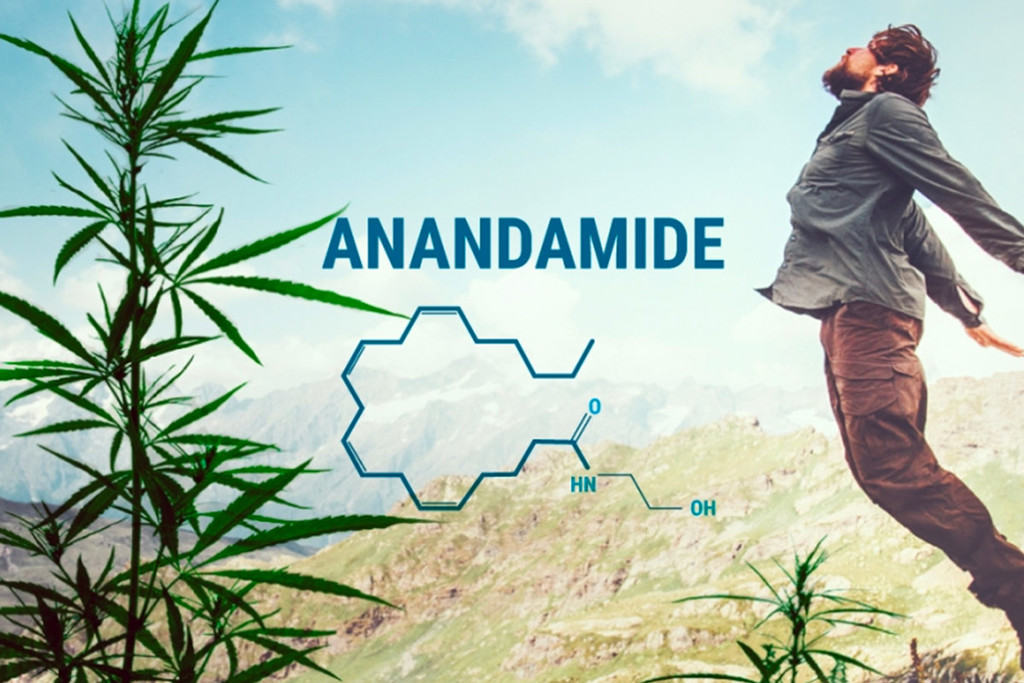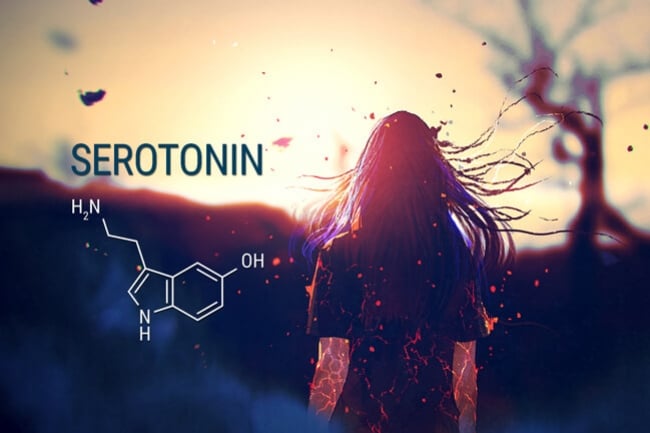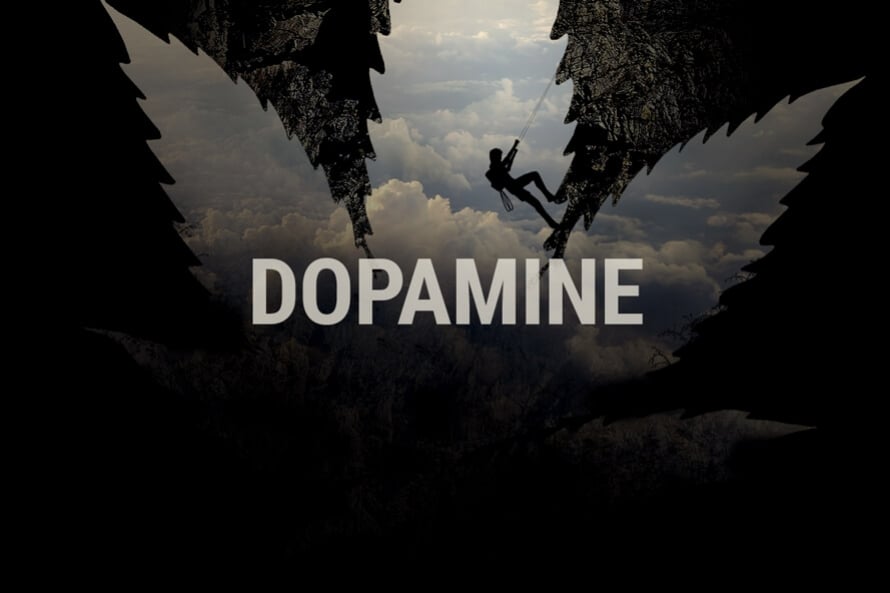.

How to Get High Naturally
Most of us fire up a bong or blunt when we want to get high—and it works. But did you know that nature offers many different means to alter our consciousness in a favourable way? These methods include boosting THC-like molecules in the brain by going for a run, inhaling airborne terpenes while walking among the trees, and simply going barefoot.
Humans have a baseline neurochemistry (which varies slightly from person to person) that enables us to experience reality and function in it. This everyday state has allowed us to survive for hundreds of thousands of years; it's lenient enough to enable us to autumn in love and reproduce, while keeping us grounded enough to look out for threats and obey the physiological command of “fight or flight” when necessary.
However, over this long period of existence, humans have figured out myriad ways to shift our neurochemistry more to the ethereal side of things. When our survival instincts aren’t occupied by predators, shelter, food, and water, we start looking for ways to alter our consciousness for spiritual, recreational, and performance-enhancing reasons.
Many cultures engage in chasing a high of some kind. Populations in the Amazon blend botanicals into powerful DMT-containing brews, Mesoamerican cultures used psilocybin mushrooms for divination purposes, and just about every other person in the West uses caffeine or nicotine to stimulate themselves during the working day. Adding to this, around 200 million humans worldwide use cannabis in one form or another.
But it’s not just psychotropic substances that can produce a “high”; there are also natural experiences, activities, and phenomena that can generate feelings of elation, relaxation, and well-being similar to being stoned on THC—without the need to imbibe cannabis.
With this in mind, follow along as we dive into the nature of a high and share various ways in which humans can experience this phenomenon, naturally.
What Is a High?
The Merriam-Webster Dictionary defines a high as “an excited, euphoric, or stupefied state produced by or as if by a drug”. In many contexts, getting high refers to using a chemical of synthetic or botanical origin to change our consciousness in a way that makes us feel elevated, charged, euphoric, or unusually relaxed and social. Let’s focus on cannabis for a moment.
Cannabis produces around 500 unique secondary metabolites—compounds that plants manufacture largely to defend themselves against environmental stressors. Among these, over 100 belong to the cannabinoid class. The primary psychoactive constituent of the herb, THC, is part of this family.
Every time you smoke a joint, THC diffuses through the lungs into the bloodstream and makes its way to the brain. Here, it binds to a receptor known as CB1, which belongs to the body’s endocannabinoid system (ECS). This simple process has profound implications. It leads to a surge of dopamine[1], may activate serotonin receptors and inhibit serotonin reuptake, and fuels neuronal activity that gives rise to sensations of euphoria, bliss, and creativity.
Interestingly, CB1 receptors accept THC because it shares a similar molecular structure to an endogenous (internally produced) molecule called anandamide. The name of this chemical has roots in the Sanskrit word “ananda”, which means “bliss”. Anandamide also has an impact on mood[2] and feelings of reward.
Cannabis is just one member of an extensive pantheon of substances that enable us to get high. Indeed, many other plants and fungal species also contain cannabinoids or cannabinoid-like substances that interact with the ECS. Among these, several forms of the perennial herb Echinacea produce alkamides that, much like THC, bind to CB1 receptors.

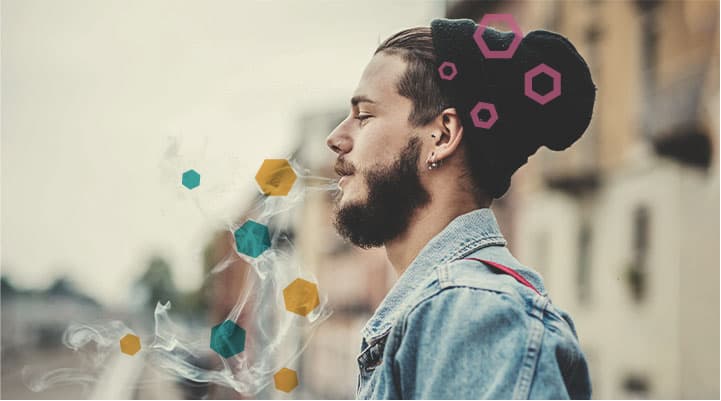
Natural vs Drug Highs
Drugs exist all throughout nature. They occur in plants, fungi, and the human brain. Using our drug-filled brains, humans have also managed to craft many synthetic psychoactive compounds in laboratories. But how do natural highs produced by endogenous chemicals compare to those of plant, fungal, or laboratory origins?
In truth, there are a lot of similarities. The human brain possesses millions of microscopic docking stations known as cellular receptors. Our body constantly churns out endogenous drugs such as cannabinoids, endorphins, and serotonin that bind to cannabinoid, opioid, and serotonin receptors, respectively. However, it does so in a consistent and balanced way that helps to maintain a functional state of consciousness while also managing mood, pain, pleasure, and reward.
Each of these endogenous chemical classes also has external chemical cousins. Cannabinoids bind to cannabinoid receptors, morphine binds to opioid receptors, and MDMA binds to serotonin receptors. When we take these substances, we expose our receptors to agonists (chemicals that bind to them) in much higher quantities (compared to the natural levels our brain produces) to such an extent that we feel high.
However, we can also consciously influence the level of endogenous compounds that our brain produces to induce a natural high. These experiences are far less intense than those caused by external drugs, but they still feel damn good and rewarding. Simple actions such as exercise, gardening, and eating the right foods can catalyse a surge in endogenous drugs and trigger a natural high. You're still technically "on drugs"—only much safer ones with far fewer side effects. In the words of ethnopharmacologist Dennis McKenna, “We’re all on drugs, all the time”.
How Can You Get High Naturally?
From exercise and gardening to forest bathing, certain activities are able to shift the balance of our neurochemical "soup" toward feelings of happiness, euphoria, or being exceptionally relaxed and at peace. Below, you’ll discover a host of natural experiences that can get you high.
Running
Let’s start with one of the most natural activities we can possibly partake in as upright bipedal mammals: running. Human ancestors started to jog around two million years ago. Before our minds started to develop hunting tools such as spears, we used to engage in persistence hunting—the act of chasing prey over such large distances that the target collapsed in exhaustion. While many animals are fast over short distances, they’re poor long-distance runners because they cannot regulate heat as well as humans. Running also allows us to escape being hunted ourselves, in the form of anaerobic bursts of sprinting.
Of course, nowadays we don’t need to chase our food or sprint from predators. But many of us continue to run because it keeps us in shape, benefits cardiovascular health, and simply feels good. Many avid runners report experiencing a “runner’s high” after a bout of bipedal aerobic activity. Researchers have spent considerable effort looking to determine what underpins this sensation of euphoria. Endogenous opioids play a role (the body wants to offset the pain of slamming its feet into the ground repeatedly, after all), but reportedly so does anandamide[3]. An increase in anandamide production and CB1 receptor activation us to get high for free.


Gardening
Though it may not come to mind immediately, gardening also belongs on the list of activities that can make you feel high. Sunshine, fresh air, community, and a sense of reward and self-sufficiency all play a role in inducing bliss—but none impact our biochemistry as powerfully as the soil itself.
If you have a penchant for growing plants, you’ve probably stumbled across the concept of the soil food web. This term refers to the matrix of life that helps to break down organic matter into nutrients that plants can absorb. Small mammals, worms, and microbial creatures are important members of the soil food web, but microbes such as bacteria and fungi are the most prolific members—a teaspoon of soil contains more living organisms than there are people on Earth.
Some of these organisms cause plant disease, some live in and on plants in a symbiotic fashion and help them to survive, and others even affect the human brain. As we pull weeds out of the ground, transplant seedlings, and generally rummage around in the soil, we expose ourselves to a bacteria known as Mycobacterium vaccae, which has been shown to boost serotonin levels[4], improve emotional health, and even boast anti-inflammatory[5], stress-alleviating, and immunoregulatory properties.
Sex and Love
Sex and love are two very different things, but both have a dramatic impact on our neurochemistry, and can make us feel high. Humans are hard-wired to reproduce, hence why our brain rewards us with a bombardment of feel-good chemicals before, during, and after the act of sex. But love also has an evolutionary role, ensuring partners form a solid social bond that pulls them into remaining together, increasing the odds of offspring.
Both love and sex start with attraction and lust—two sensations that have roots in the sex hormones testosterone and oestrogen, and the mood-boosting neurotransmitter dopamine. Particularly rigorous intercourse also has a similar effect to exercise, meaning anandamide plays a role, too. Finally, the neuropeptide oxytocin helps to facilitate and deepen social bonding, and plays a role in both the physiology of orgasm and the emotion of love.
Forest Bathing
If you smoke cannabis, you probably know a thing or two about terpenes. These volatile aromatic compounds underpin the unique scent of each cultivar, and, alongside cannabinoids, impact the psychoactive experience induced by a given strain. While cannabis produces around 200 terpenes, around 30,000 of these compounds are found throughout nature in the tissues of plants, fungi, insects, and even animals.
Whenever you take a peaceful stroll through a forest—an activity sometimes referred to as forest bathing—you breathe in aerosolised terpenes that have an effect on human cognition. For example, pine forests are a rich source of the terpene isomers α- and β-pinene (also found in cannabis), which influence inflammation, mood[6], and memory.
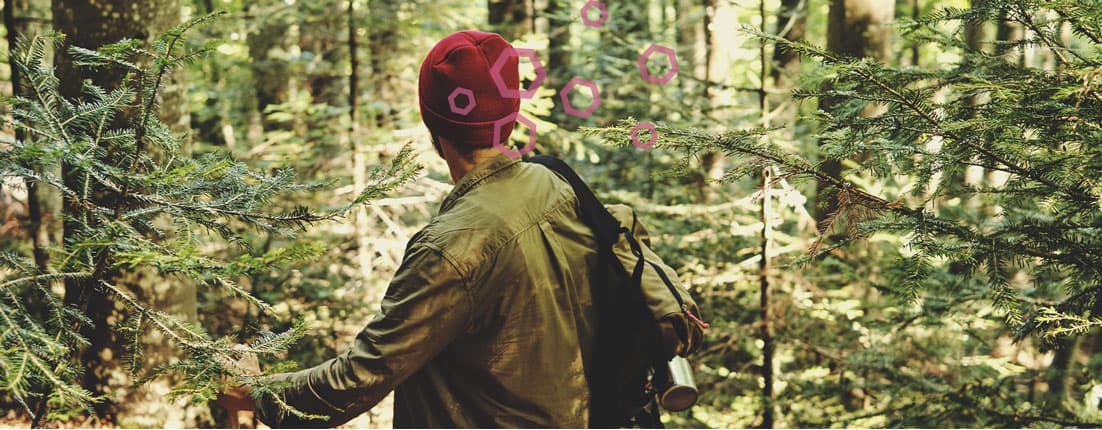
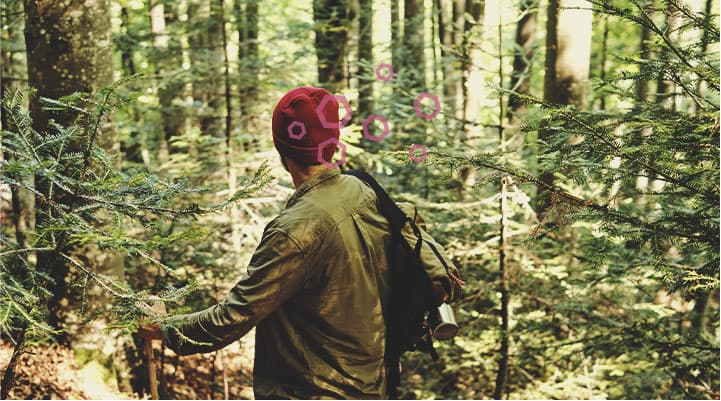
Earthing
Thanks to rubber shoes and rubber tyres (two effective insulators of electricity), many of us spend decades without coming into barefoot contact with the Earth. Why does this matter? Because—on an atomic level—our bodies are electric and evolved in close physical contact with our planetary host. When we kick off our shoes and walk barefoot in a verdant meadow or along a golden beach, we come into direct contact with the Earth’s natural electric charge. Research shows that doing so helps to stabilise human physiology, reduce stress, improve sleep, and generate feelings of well-being[7].
Breathing Exercises
Breathing exercises span back into antiquity, originating in the Eastern practices of yoga and tai chi. Modern adaptations of breathing exercises include the Wim Hof Method and holotropic breathing. These routines come with a host of benefits, including increased resistance to stress, improved focus, alleviation of anxiety, and a more efficient pair of lungs. However, such methods can also have a profound effect on human consciousness.
The process of holotropic breathing aims to facilitate emotional healing, and research shows an association between the practice and reductions in death anxiety[8] and existential life issues[9], as well as higher levels of self-awareness[10]. Some practitioners even report holotropic breathing to induce a state that mimics the experience of psychedelics.
Chocolate and Black Truffles
Chocolate and black truffles provide botanical and fungal means of "hacking" the endocannabinoid system. Black truffles (Tuber melanosporum) are a prized culinary sclerotia that provide nutty, earthy, and chocolatey flavours. Taste aside, a particular chemical likely plays a role in how sought-after and valuable these fungi are. While black truffles don’t feature an endocannabinoid system, they do produce biosynthetic enzymes that allow them to manufacture the endocannabinoid anandamide[11]. Therefore, every time you grate black truffle over a plate of pasta, you ingest a cannabinoid associated with mood elevation.
What about chocolate? Contrary to popular belief, cacao doesn’t contain anandamide. However, it serves as a source of (brace yourself for these names) N-linoleoyl ethanolamide and N-oleoylethanolamide. Both of these molecules work to inhibit a catabolic enzyme by the name of fatty acid amide hydrolase (FAAH). In the body, FAAH is tasked with breaking down anandamide. When these chemicals inhibit it, the feel-good molecule floats around for longer.
Music
Music can get us high! When you think about it, it’s amazing that carefully arranged frequencies have such a profound impact on the human mind, and that a multi-billion-dollar industry revolves around pulsing sound waves. Listening to music helps to decrease anxiety and blood pressure, and elevates mood[12]. Why? Those chills that ripple across your skin when you hear a particularly good song are largely the result of a surge of dopamine.


Embrace Nature’s Pharmacy
You’re now aware of plenty of natural experiences that can get you high in a way similar to using cannabis. Nature offers a host of other ways to alter consciousness, from external phytochemicals found in fungi and plants to barefoot contact with the surface of the Earth. You can also influence your body’s chemical pharmacopoeia through physical exercise, tending to plants in your garden, and taking a stroll through the woods. You can even layer these experiences to synergise their effects. For example, you can practise breathing exercises while barefoot on the beach to ground your body and elevate your mind, or go running through a forest to pair anandamide release with aerosolised terpenes for a unique entourage effect.
- The effects of Δ9-tetrahydrocannabinol on the dopamine system https://www.ncbi.nlm.nih.gov
- Brain activity of anandamide: a rewarding bliss? https://www.nature.com
- A runner’s high depends on cannabinoid receptors in mice https://www.pnas.org
- Study linking beneficial bacteria to mental health makes top 10 list for brain research https://www.colorado.edu
- ffects of Immunization With the Soil-Derived Bacterium Mycobacterium vaccae on Stress Coping Behaviors and Cognitive Performance in a “Two Hit” Stressor Model https://www.frontiersin.org
- settings Open AccessReview Therapeutic Potential of α- and β-Pinene: A Miracle Gift of Nature https://www.mdpi.com
- Integrative and lifestyle medicine strategies should include Earthing (grounding) https://www.sciencedirect.com
- Holotropic breathwork: An experiential approach to psychotherapy https://www.researchgate.net
- A Clinical Report of Holotropic Breathwork in 11,000 Psychiatric Inpatients in a Community Hospital Setting https://maps.org
- Measure of Significance of Holotropic Breathwork in the Development of Self-Awareness https://www.liebertpub.com
- Beyond Cannabis: Plants and the Endocannabinoid System http://ethanrusso.org
- Keep Your Brain Young with Music https://www.hopkinsmedicine.org


























